CLICK HERE FOR BOOKS IN OTHER LANGUAGES

Jandrić, P., Suoranta, J., Teräs, M., & Davis, H. (Eds.). (2025). Postdigital (Re)Imaginations: Critiques, Methods, and Interventions. Cham: Springer. https://doi.org/10.1007/978-3-032-01539-6.
This edited volume presents the latest achievements of postdigital scholarship in the field of future studies. Showing that current policy frameworks are dominated by capitalist imaginaries, the book insists on the development of radically different futures. This task is approached in five different ways. The book begins with an overview of the many ways to approach postdigital imaginations as emancipatory practices, followed by some urgent reimaginations of older ideas. It moves on to critiques of current practices, policies, and imaginaries, and develops postdigital research methods for the development of emancipatory educational imaginaries. Showcasing some recent interventions in educational politics, policy, and practice, it links presented work on postdigital imaginations with recent postdigital inquiry related to the geopolitics of postdigital educational development. This book is suited for educators, policy-makers, and any researcher fascinated by the unbounding of education from capitalist imaginaries and reframing it within an emancipatory future.

Peters, M. A., Kamenarac, O., Green, B. J., Jandrić, P., & Besley, T. (Eds.). (2025). Postdigital Education for Development. Cham: Springer. https://doi.org/10.1007/978-3-031-99247-6.
This edited volume unpacks the profound deterritorializing and reterritorializing shifts taking place across the globalized, networked educational landscape, interjecting into pervasive, predominant education development (EdDev) discourses. Highlighting the transdisciplinarity of postdigital studies, this book engages with core facets of contemporary educational development, such as educational geopolitics, policy discourses, global funding institutions, cooperative developmental initiatives, national imaginaries of educational development, the university, stakeholder collectives, and pedagogical and curricular frameworks. It provides a comprehensive understanding of current EdDev discourse and practice, its failings, and how technology-driven disruptions can open up avenues for alternative reimaginings of educational futures. The research presented foregrounds a conceptualization of inclusive postdigital educational ecosystems that catalyze educational futures built around human-centered technological advancements in support of sustainable bio-digital planetary development. This book is suited for educators and researchers of educational development and policy.
Postdigital Education for Development is complemented by The Geopolitics of Postdigital Educational Development, also edited by Michael A. Peters, Ben Green, Olivera Kamenarac, Petar Jandrić, and Tina Besley.

Peters, M. A., Green, B. J., Kamenarac, O., Jandrić, P., & Besley, T. (Eds.). (2025). The Geopolitics of Postdigital Educational Development. Cham: Springer. https://doi.org/10.1007/978-3-031-99378-7.
This volume examines the evolving role of education in contemporary geopolitical landscapes, where technological innovation, global networks, and national interests redefine its purpose. Moving beyond territorial geopolitics, it explores education as a critical asset in postdigital societies, embedded in techno-nationalist agendas and global power structures. In AI, genomics, nanotechnology, and quantum technologies, education serves dual functions: shaping epistemic authority and underpinning knowledge economies. These developments challenge paradigms of truth, consciousness, and equitable knowledge access. The chapters engage with discourses on digital sovereignty, postdigital privilege, democracy, and resistance, illustrating how education restructures global power relations. Synthesizing perspectives from geopolitics, digital transformation, and postdigital educational development, it underscores understanding education as a contested terrain where global equity, inclusion, and ethical technological governance are negotiated. This book is particularly suited for researchers of postdigital education.
The Geopolitics of Postdigital Educational Development is complemented by Postdigital Education for Development, also edited by Michael A. Peters, Olivera Kamenarac, Ben Green, Petar Jandrić, and Tina Besley.
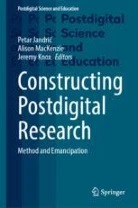
Jandrić, P., MacKenzie, A., & Knox, J. (Eds.). (2023). Constructing Postdigital Research: Method and Emancipation. Cham: Springer. https://doi.org/10.1007/978-3-031-35411-3.
This book delves into the various methods of constructing postdigital research, with a particular focus on the postdigital dynamic of inclusion and exclusion, as well as the interplay between method and emancipation. By answering three fundamental questions - the relationship between postdigital theory and research practice, the relationship between method and emancipation, and how to construct emancipatory postdigital research - the book serves as a comprehensive resource for those interested in conducting postdigital research.
Constructing Postdigital Research: Method and Emancipation is complemented by Postdigital Research: Genealogies, Challenges, and Future Perspectives, also edited by Petar Jandrić, Alison MacKenzie, and Jeremy Knox, which explores these questions in theory.

Jandrić, P., MacKenzie, A., & Knox, J. (Eds.). (2023). Postdigital Research: Genealogies, Challenges, and Future Perspectives. Cham: Springer. https://doi.org/10.1007/978-3-031-31299-1.
This book explores genealogies and the challenges related to the concept of the postdigital, the ambiguous nature of postdigital knowledges, and the many faces of postdigital sensibilities. The book answers three key questions: What is postdigital knowledge? What does it mean to do postdigital research? What, if anything, is distinct from research conducted in other perspectives? As such, this book is a one-stop publication for those interested in the theory of postdigital research. Postdigital Research: Genealogies, Challenges, and Future Perspectives is complemented by Constructing Postdigital Research: Method and Emancipation, also edited by Petar Jandrić, Alison MacKenzie, and Jeremy Knox, which explores these questions in practice.
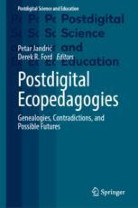
Jandrić, P., & Ford, D. R. (Eds.). (2022). Postdigital Ecopedagogies: Genealogies, Contradictions, and Possible Futures. Cham: Springer. https://doi.org/10.1007/978-3-030-97262-2.
This book conceptualizes ecopedagogies as forms of educational innovation and critique that emerge from, negotiate, debate, produce, resist, and/or overcome the shifting and expansive postdigital ecosystems of humans, machines, nonhuman animals, objects, stuff, and other forms of matter. Contemporary postdigital ecosystems are determined by a range of new bioinformational reconfigurations in areas including capitalism, imperialism, settler-colonialism, and ontological hierarchies more generally. Postdigital ecopedagogies name a condition, a question, and a call for experimentation to link pedagogical research and practice to challenges of our moment. They pose living, breathing, expanding, contracting, fluid, and spatial conditions and questions of our non-chronological present. This collection presents analyses of that present from a wide spectrum of disciplines, including but not limited to education studies, philosophy, politics, sociology, arts, and architecture.
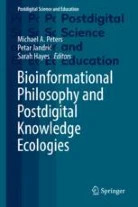
Peters, M. A., Jandrić, P., & Hayes, S. (Eds.). (2022). Bioinformational Philosophy and Postdigital Knowledge Ecologies. Cham: Springer. https://doi.org/10.1007/978-3-030-95006-4.
The book presents a cross-disciplinary overview of critical issues at the intersections of biology and information science. Based on theories of bioinformationalism, viral modernity, the postdigital condition, and others, this book explores two inter-related questions: Which new knowledge ecologies are emerging? Which philosophies and research approaches do they require?
The book argues that the 20th century focus on machinery needs replaced, at least partially, by a focus on a better understanding of living systems and their interactions with technology at all scales – from viruses, through human beings, to Earth's ecosystem. This change of direction cannot be made by simple relocation of focus and/or funding from one discipline to another. In our age of the Anthropocene, (human and planetary) biology cannot be thought of without (digital) technology. Today's curious bioinformational mix of blurred and messy relationships between physics and biology, old and new media, humanism and posthumanism, knowledge capitalism and bio-informational capitalism defines the postdigital condition and creates new knowledge ecologies.
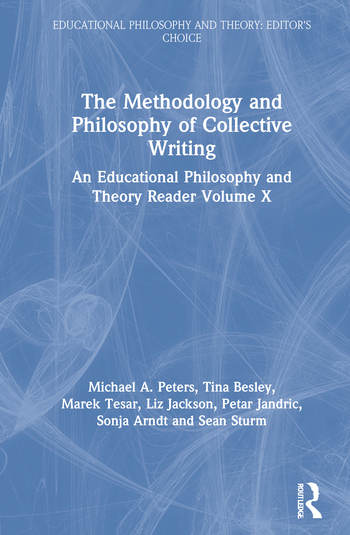
Peters, M. A., Tesar, M., Jackson, L., Besley, T., Jandrić, P., Arndt, S., & Sturm, S. (2021). The Methodology and Philosophy of Collective Writing. Abingdon and New York: Routledge. https://doi.org/10.4324/9781003171959.
This book develops the philosophy, methodology and pedagogy of collective writing as a new mode of academic writing as an alternative to the normal academic article. The philosophy of collective writing draws on a new mode of academic publishing that emphasises the metaphysics of peer production and open review along with the main characteristics of openness, collaboration, co-creation and co-social innovation, peer review and collegiality that have become a praxis for the self-reflection emphasising the subjectivity of writing, sometimes called self-writing. This collection, under the EPAT series Editor's Choice, draws on a group of members of the Editors' Collective,who constitute a network of editors, reviewers and authors who established the organisation to further the aims of innovation in academic writing and publishing. It provides discussion and examples of the philosophy, methodology and pedagogy of collective writing. Split into three sections: Introduction, Openness and Projects, this volume offers an introduction to the philosophy and methodology of collective writing. It will be of interest to scholars in philosophy of education and those interested in the process of collective writing.
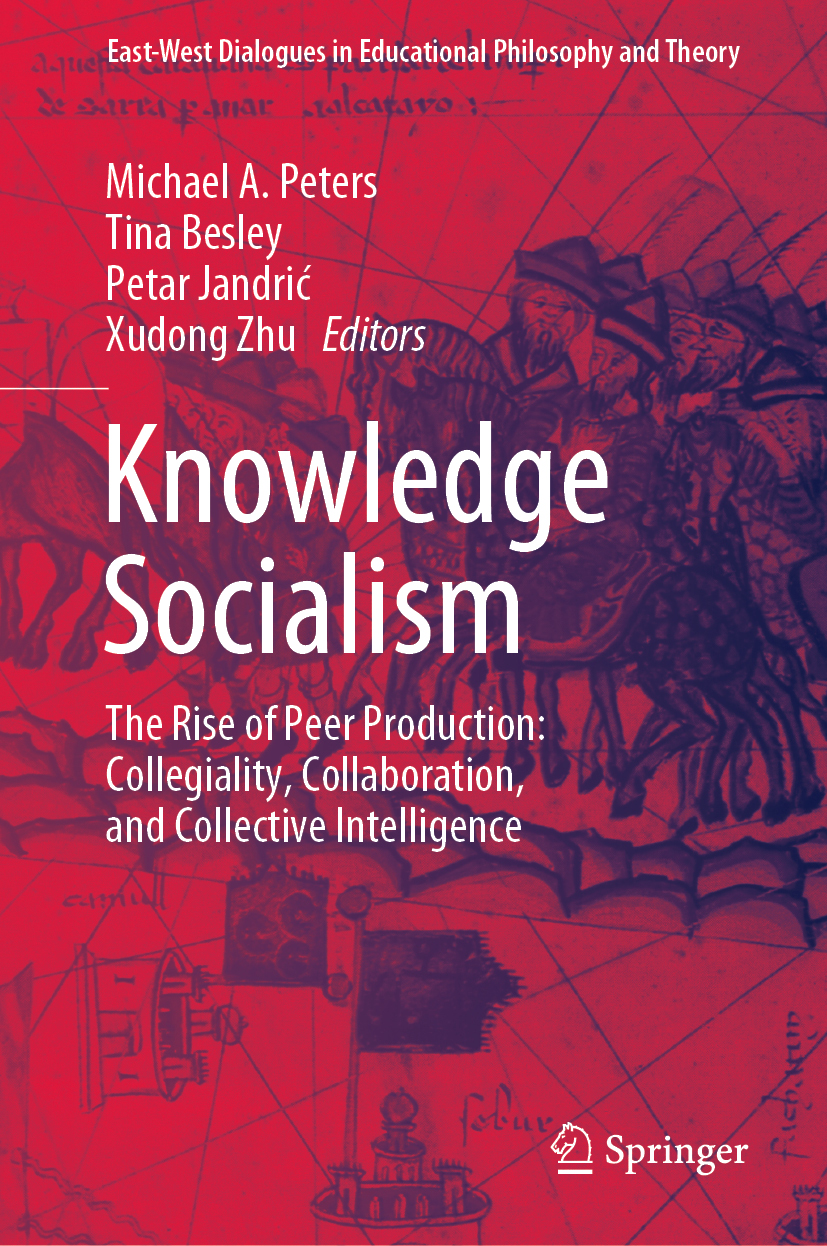
Peters, M. A., Besley, T., Jandrić, P., & Zhu, X. (Eds.). (2020). Knowledge Socialism. The Rise of Peer Production: Collegiality, Collaboration, and Collective Intelligence. Singapore: Springer. https://doi.org/10.1007/978-981-13-8126-3.
This is the first collection focusing on knowledge socialism, a particularly apt term used to describe a Chinese socialist mode of production and socialist approach to development and modernity based around the rise of peer production, new forms of collaboration and collective intelligence. Making the case for knowledge socialism, the book is intended for students, teacher, scholars and policy theorists in the field of knowledge economy.
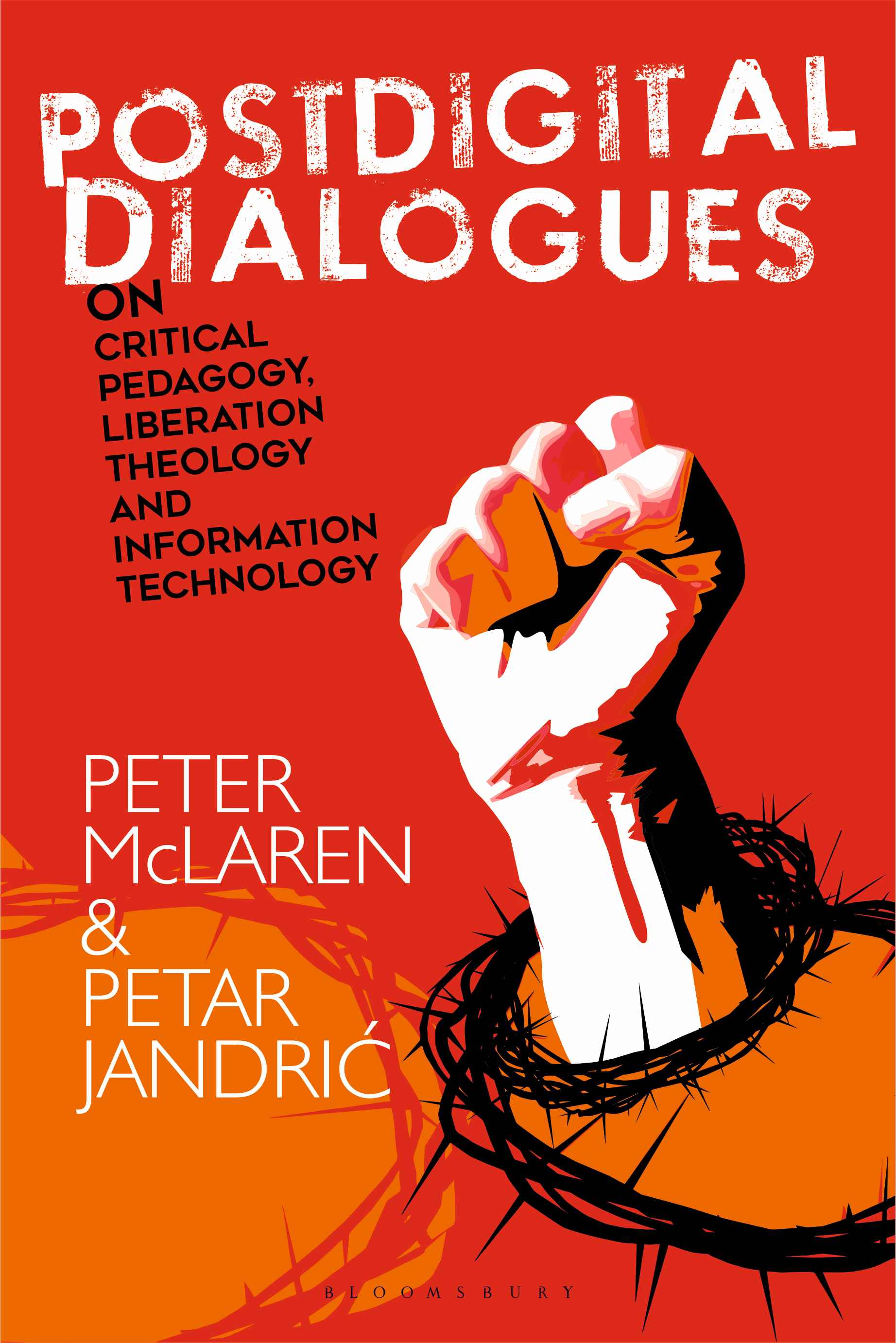
McLaren, P. & Jandrić, P. (2020). Postdigital Dialogues on Critical Pedagogy, Liberation Theology and Information Technology. London: Bloomsbury. http://dx.doi.org/10.5040/9781350099982.
Postdigital Dialogues on Critical Pedagogy, Liberation Theology and Information Technology presents a series of dialogues between Peter McLaren, a founding figure of critical pedagogy, and Petar Jandrić, a transdisciplinary scholar working at the intersections between critical pedagogy and information technology. The authors debate the postdigital condition, its wide social impacts, and its relationship to critical pedagogy and liberation theology, as part of a transdisciplinary effort to develop a new postdigital revolutionary consciousness in the service of humanity. Throughout the dialogues we see how McLaren's thinking on critical pedagogy and liberation theology have developed since the publication of Pedagogy of Insurrection, and how these developments play out in Jandrić's theory of the postdigital condition.
The book includes a foreword by Peter Hudis and an afterword by Michael A. Peters.
Review (Joni Schwartz) link pdf Review (Julia Mañero) link pdf
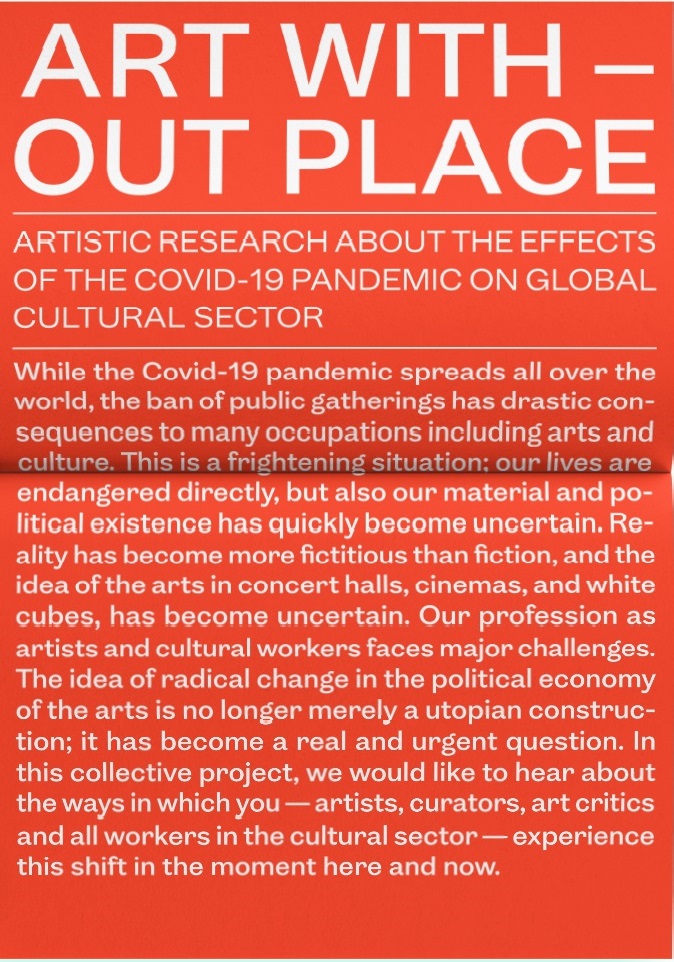
Kuzmanić, A., & Jandrić, P. (2020). Art Without Place. Zagreb: Oaza.
While the Covid-19 pandemic spreads all over the world, the ban of public gatherings has drastic consequences to many occupations including arts and culture. This is a frightening situation; our lives are endangered directly, but also our material and political existence has quickly become uncertain. Reality has become more fictitious than fiction, and the idea of the arts in concert halls, cinemas, and white cubes, has become uncertain. This collective project shares the voices of artists, curators, art critics and other workers in the cultural sector and how they experience this shift in the moment here and now. The publication is a result of artistic research initially conveyed in 2020 online via www.artwithoutplace.com.
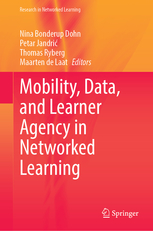
Dohn, N.B., Jandrić, P., & Ryberg, T., de Laat, M. (Eds.). (2020). Mobility, Data, and Learner Agency in Networked Learning. Singapore: Springer.
The chapters in this book are based on selected peer reviewed research papers presented at the 11th biennial Networked Learning Conference (NLC) 2018 held in Zagreb and were chosen as exemplars of cutting edge research on networked learning. The chapters are organized into three main sections: 1) Aspects of mobility for Networked Learning in a global world, 2) Use and misuse of algorithms and learning analytics, 3) Understanding and empowering learners. The three main sections are flanked by chapters which introduce and reflect on Networked Learning as epistemic practice. The concluding chapter draws out perspectives from the chapters and discusses emerging issues.
The book focuses on the nature of learning and interactions as an important characteristic sought out by researchers and practitioners in this field.
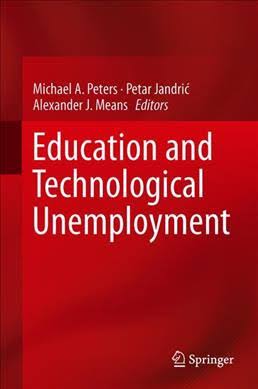
Peters, M. A., Jandrić, P., & Means, A. J. (Eds.). (2019). Education and Technological Unemployment. Singapore: Springer. https://doi.org/10.1007/978-981-13-6225-5.
This book examines the challenge of accelerating automation, and argues that countering and adapting to this challenge requires new methodological, philosophical, scientific, sociological, economic, ethical, and political perspectives that fundamentally rethink the categories of work and education. What is required is political will and social vision to respond to the question: What is the role of education in a digital age characterized by potential mass technological unemployment?
Today's technologies are beginning to cost more jobs than they create – and this trend will continue. There have been many proposed solutions to this problem, and they invariably involve an educational vision. Yet, in a world that simply doesn't offer enough work for everyone, education is clearly not a panacea for technological unemployment.
This collection presents responses to this question from a wide spectrum of disciplines, including but not limited to education studies, philosophy, history, politics, sociology, psychology, and economics.
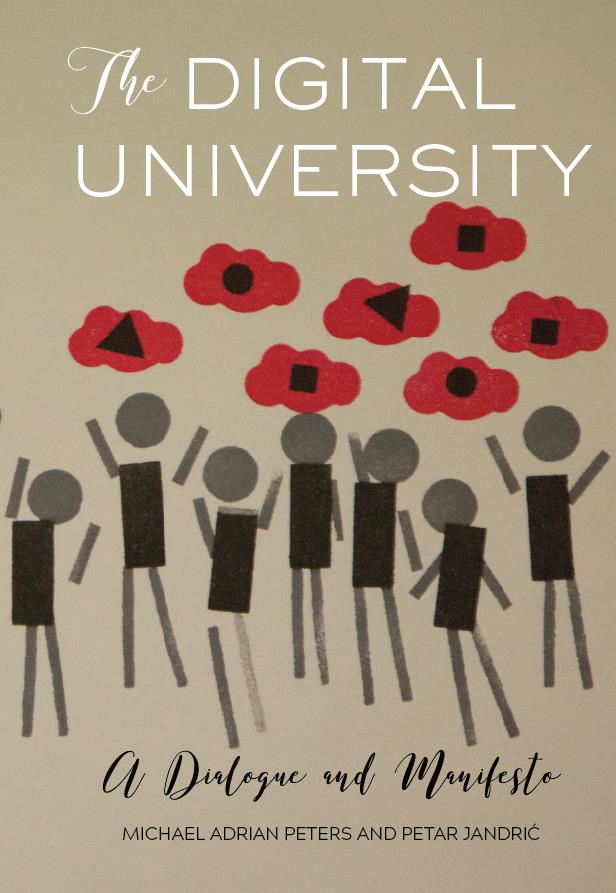
Peters, M. A. & Jandrić, P. (2018). The Digital University: A Dialogue and Manifesto. New York: Peter Lang.
The Digital University: A dialogue and manifesto focuses on teaching, learning and research in the age of the digital reason and their relationships to the so-called knowledge economy. The first part of the book, 'The university in the epoch of digital reason', presents authors' insights into the nature of the contemporary university. The second part of the book, 'Collective intelligence and the co-creation of social goods', explores various collective ways of knowledge creation, dissemination, and education. The third part of the book, 'Digital teaching, digital learning and digital science', presents an ongoing series of one-to one dialogues between Michael Adrian Peters and Petar Jandrić about philosophy of education in the age of digital reason, relationships between learning, creative col(labor)ation, and knowledge cultures, digital reading, digital self, digital being, radical openness, creative labour, and the co-production of symbolic goods. Situated in, against, and beyond the current state of affairs, the book ends with the Digital University Manifesto which explores what is to be done in and for a better future of the digital university.
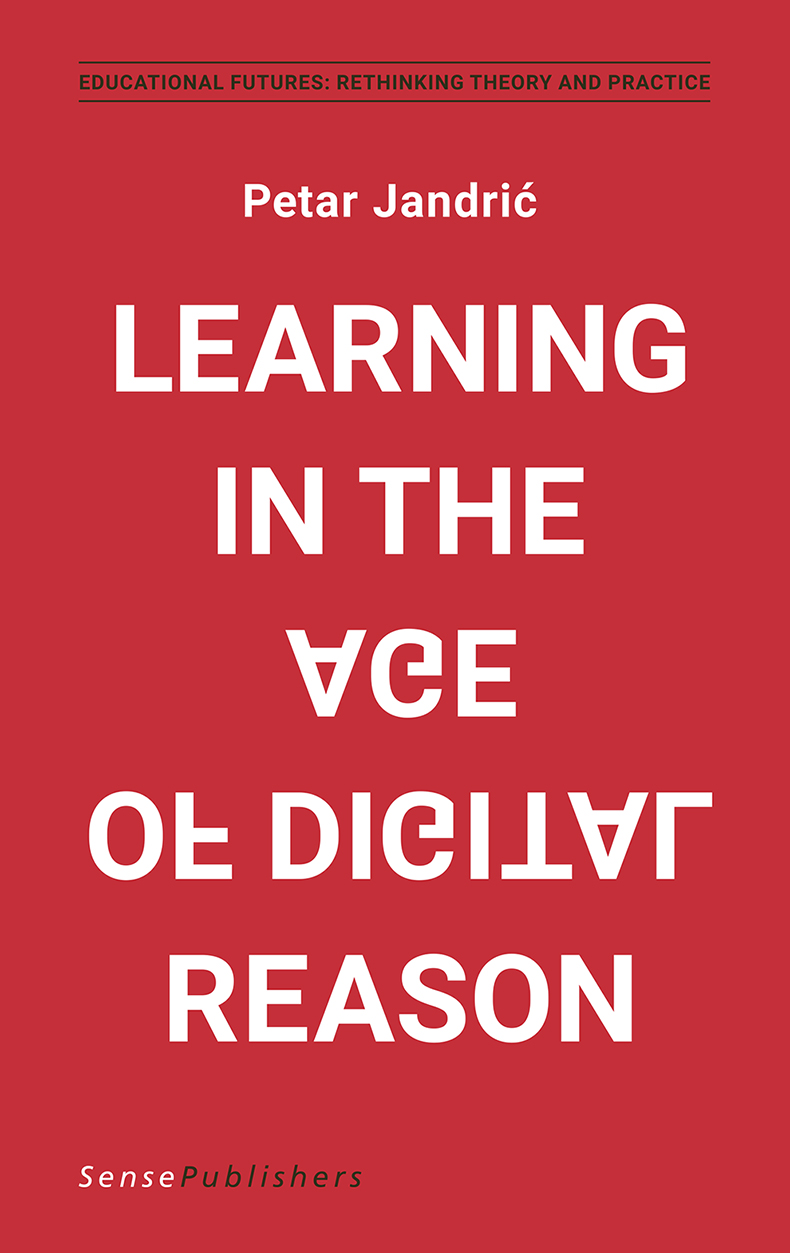
Jandrić, P. (2017). Learning in the Age of Digital Reason. Rotterdam: Sense. https://doi.org/10.1007/978-94-6351-077-6.
Learning in the Age of Digital Reason brings 16 in-depth dialogues between Petar Jandrić and leading scholars and practitioners in diverse fields of history, philosophy, media theory, education, practice, activism, and arts. The book creates a postdisciplinary snapshot of our reality, and the ways we experience that reality, at the moment here and now. lt historicises our current views on human learning, and experiments with collective knowledge making and the relationships between theory and practice. lt stands firmly at the side of the weak and the oppressed, and aims at critical emancipation. Learning in the Age of Digital Reason is playful and serious. lt addresses important issues of our times and avoids the omnipresent (academic) sin of pretentiousness, thus making an important statement: research and education can be sexy. Interlocutors presented in the book (in order of appearance): Larry Cuban, Andrew Feenberg, Michael Adrian Peters, Fred Turner, Richard Barbrook, McKenzie Wark, Henry Giroux, Peter McLaren, Siân Bayne, Howard Rheingold, Astra Taylor, Marcell Mars, Tomislav Medak, Ana Kuzmanić, Paul Levinson, Kathy Rae Huffman, Ana Peraica, Dmitry Vilensky (Chto Delat?), Christine Sinclair, and Hamish Macleod.
Book Flyer Free Preview (pp. 1-28) Buy this book (Sense) Buy this book (Amazon)
Review (Nataša Lacković) Review (Sarah Hayes) Review (Jeremy Knox link) Review (Jeremy Knox pdf) Review Symposium (Thomas Ryberg, Juha Suoranta, Derek Ford link) Review (Jenn McArthur link) Review (Callum McGregor pdf) Review (Julia Manero link)
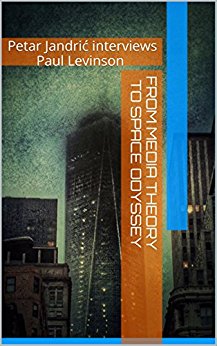
Levinson, P. & Jandrić, P. (Eds.). (2016). From Media Theory to Space Odyssey: Petar Jandrić interviews Paul Levinson. Amazon Kindle.
In this wide-ranging interview by Petar Jandrić, Paul Levinson talks about his relationship with Marshall McLuhan and McLuhan's relevance to our current world of media and politics, how the ways we communicate determine major developments in society, the role of philosophy in science fiction, religion as a necessary motive of space exploration, online education, the Kindle revolution for the author, and much more.
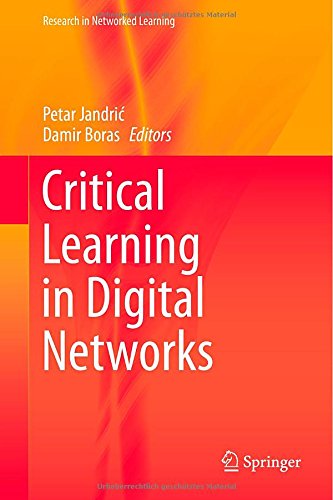
Jandrić, P. & Boras, D. (Eds.). (2015). Critical Learning in Digital Networks. New York: Springer.
This ambitious multidisciplinary volume assembles diverse critical-theory approaches to the current and future states of networked learning. Expert contributors expand upon the existing literature by analyzing the ethical aspects of networked learning and the ongoing need for more open, inclusive, and socially engaged educational practice. Chapters explore in depth evolving concepts of real and virtual, the processes of learning in, against, and beyond the internet, and the role of critical pedagogy in improving social conditions. In all, coverage is both realistic and positive about the potential of digital technologies in higher education as well as social and academic challenges on the horizon.
Review in English (Thomas Allmer, Concept, 7(3)) Review on journal website
Review in German (Philip Meyer)
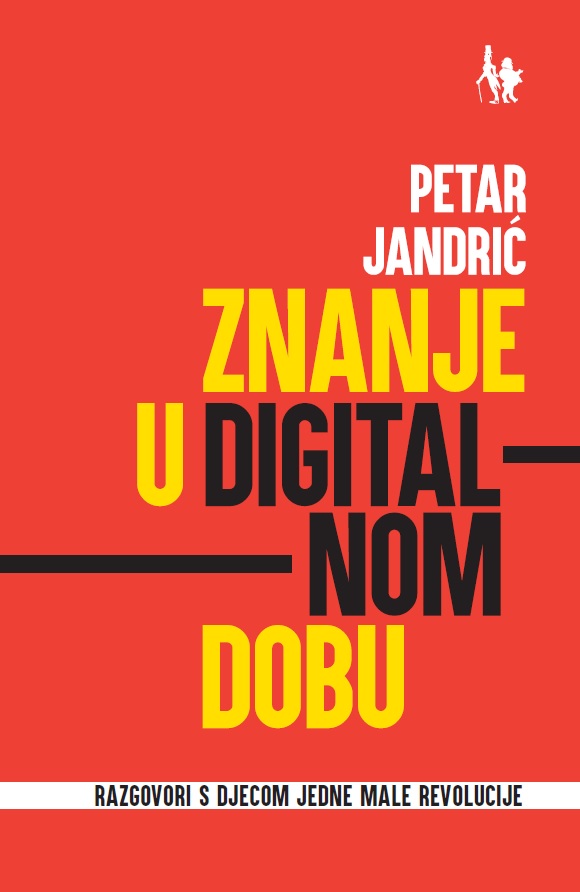
Jandrić, P. (2019). Znanje u digitalnom dobu. Razgovori s djecom jedne male revolucije. Preveo Dinko Telećan. Zagreb: Jesenski i Turk.
Znanje u digitalnom dobu donosi šesnaest razgovora sa znanstvenicima i stručnjacima iz veoma raznorodnih područja: povijesti, filozofije, medij-ske teorije, obrazovnih znanosti, aktivizma i umjetnosti. To je svojevrstan postdisciplinarni presjek naše zbilje, i načina na koji tu zbilju doživljavamo, sada i ovdje. Aktualne poglede na znanje i učenje autor prikazuje u njiho-voj povijesnosti, te tako otkriva odnose teorije s praksom. Znanje u digital-nom dobu zaigrana je i ozbiljna knjiga. Ona otvara važna pitanja našega vremena ali izbjegava akademski grijeh pretencioznosti i pokazuje kako učenje i istraživanje može biti privlačno.
Recenzija (Silva Dubravec) pdf
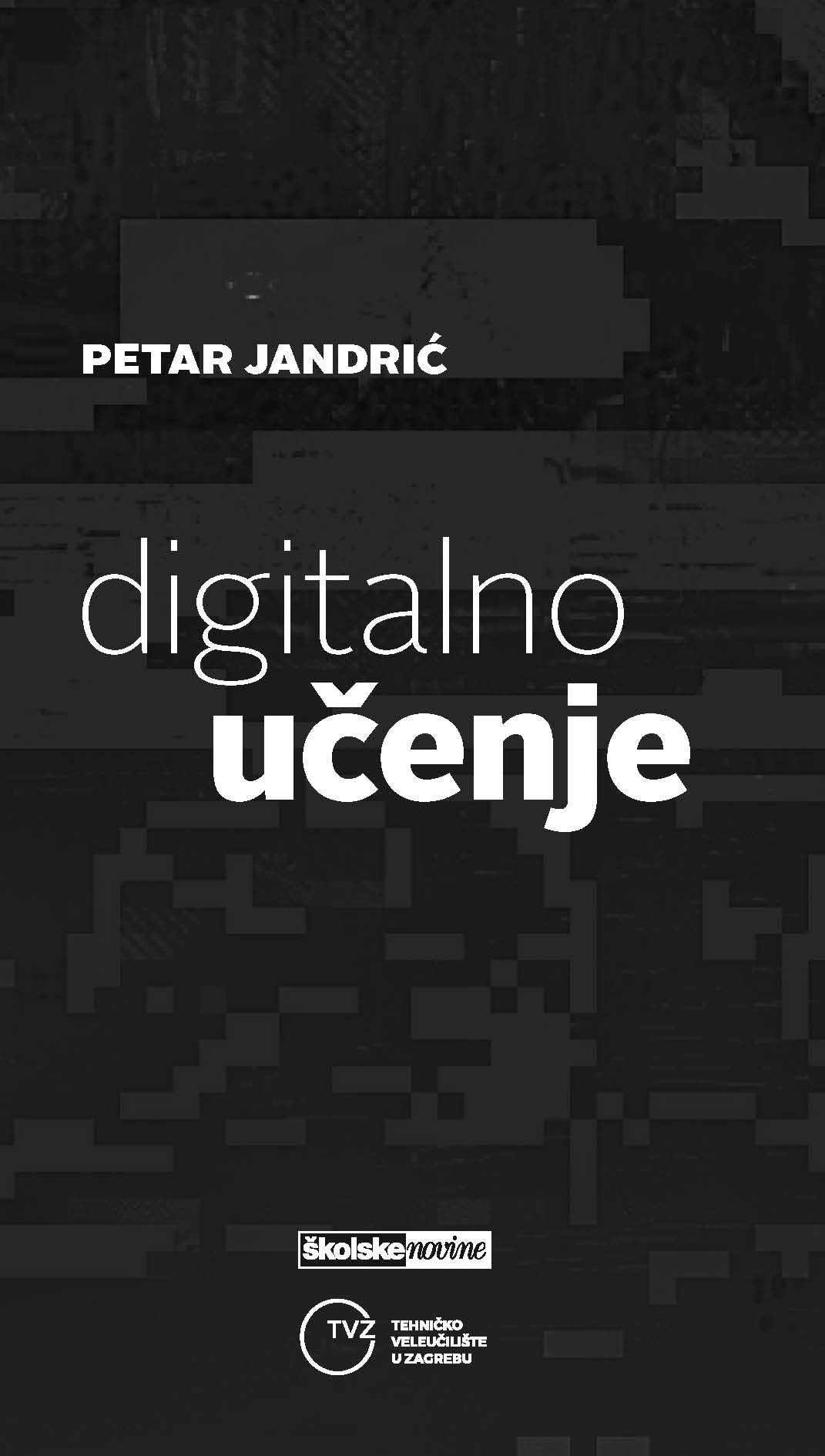
Jandrić, P. (2015). Digital Learning. Zagreb: Školske novine & Polytechnic of Zagreb. (In Croatian language)
This book is a collection of articles published in weekly column Technologies in Education in Školske novine (eng. School News – the official publication for Croatian primary and secondary teachers) during 2012/2013 and 2013/2014. It is aimed primarily at Croatian primary and secondary teachers, as well as university students of digital learning.
Review in Croatian (Školske novine)
Advertisement (Školske novine)

Jandrić, P. & Boras, D. (2013). Critical e-learning: struggle for power and meaning in the network society. Belgrade: Eduka. (In Serbian language)
The content of the book is based on the original scientific research into the theory of e-learning. It is written according to the concept of critical theory. Theoretical approach and research methodology is conceptually based on the synthesis of the theoretical knowledge in the field of information and communication science and the impact of the information technology on the changes in education and society as a whole. This book is aimed at all scientists who deal with the issues of e-learning, teachers, administrators and heads of educational institutions. Finally, it is a useful guide in higher education.
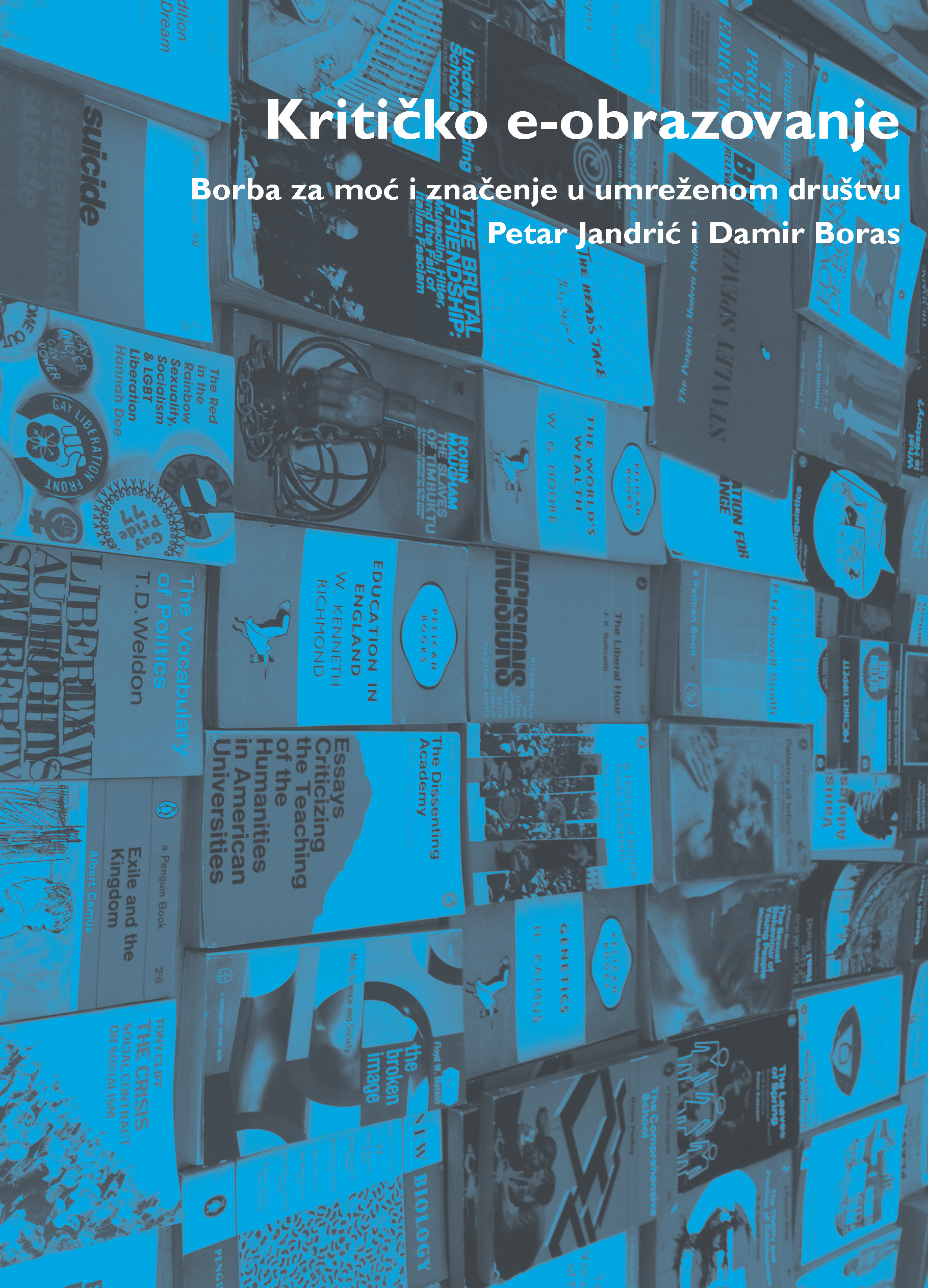
Jandrić, P. & Boras, D. (2012). Critical e-learning: struggle for power and meaning in the network society. Zagreb: Polytechnic of Zagreb & FF Press. (In Croatian language)
The content of the book is based on the original scientific research into the theory of e-learning. It is written according to the concept of critical theory. Theoretical approach and research methodology is conceptually based on the synthesis of the theoretical knowledge in the field of information and communication science and the impact of the information technology on the changes in education and society as a whole. This book is aimed at all scientists who deal with the issues of e-learning, teachers, administrators and heads of educational institutions. Finally, it is a useful guide in higher education.